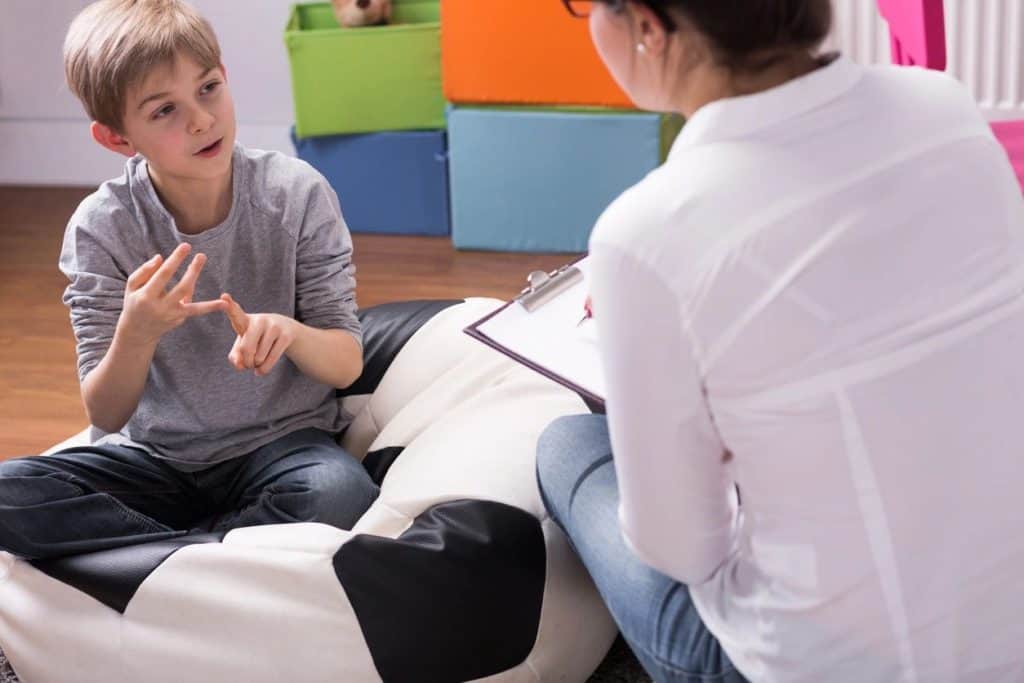Here are some ways to help you prepare your child for therapy and support them throughout the treatment process.
1. Introduce the topic during a calm and connected moment.
When we are upset, we have less access to our thinking brains. We might be more likely to use words we didn’t intend to use and frame therapy as a form of punishment. It’s also harder for children to process new information when the emotional parts of their brain are activated.
A good opportunity might be while you’re enjoying a snack together after school, during dinnertime or when you’re snuggling together before bed. Start preparing your child at least 2 to 3 days in advance for younger children and at least one week for older ones.
2. Be open and transparent about what a play therapist does and what to expect.
It’s important to normalize therapy and show there are many ways to ask for help. Let your child know they will be seeing someone who helps kids with their worries and big feelings. Show them photos in the handbook attached to this page, or on the website.
Try not to tell your child that they need to be fixed, or that they are going to play therapy for bad behaviour. This can decrease self-esteem, create a negative association with therapy and potentially hinder progress before therapy begins.
3. Arrange a meet-and-greet before your child’s first appointment.
Meet me in-person and have a full tour of the playroom! This brief visit might give your child a better sense of what to expect and lessen any worries.
4. Understand that it might get worse, before it gets better.
As your child develops new understandings of their feelings and experiences, it is typical to see changes in behaviour at home, school and in therapy.
Celebrate your child’s effort and small successes as they learn to navigate big feelings and adopt new coping strategies.
5. Keep me (or your own therapist) in the loop and share any relevant information.
If there are significant events or updates on your child and family, please let me know so I can plan accordingly. In some cases, it might be best to chat when your child is not present so concerns can be discussed freely.
6. Respect your child’s confidentiality.
How did it go? What did you talk about? Did you tell your play therapist about ____ ? It is normal for caregivers to want to ask these questions after a session. If children feel pressured to share information, or that their confidentiality may be violated, they may be less inclined to open up and be themselves in therapy.
Keep in mind progress takes time. If at anytime you would like an update, have questions or need to raise a concern, you are welcome to contact me via phone, email or through our scheduled Caregiver Feedback Meetings.
Example Explanations of Play Therapy
You know what? Sometimes we have really big feelings*. And that’s okay. I have them too. Sometimes, though, feelings can get so big we don’t know what to do with them.
When things seem really hard or when our feelings get too big, though, something we can do is ask for help. There’s a person we’re going to meet who helps kids and families, just like us, with big feelings.
They actually have a playroom where you can play with different types of toys and games. This is what it looks like. (Refer to photos in the handbook or on the website here.)
*Replace “big feelings” with “worries” if appropriate.
Example explanation 1

Child and Family Play Therapy can be a powerful intervention for young people
I know it’s been tough after (major event/transition). I think you might enjoy some special time in a playroom. There’s a place we can go to that has toys, games, sand, arts and crafts. But it’s different than other play places! There won’t be any other kids there, so it would be just for you.
It’s a place where you can have fun and be yourself. Want to see what it looks like? (Click here to see pictures of the office) There’s also a person there to help you if you need it, or play with you if you want them to.
Example explanation 2





